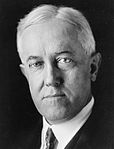This article needs additional citations for verification. (February 2019) |
| |||||||||||||||||||||||||||||
1,096 delegates to the 1924 Democratic National Convention 729 (two-thirds) votes needed to win | |||||||||||||||||||||||||||||
|---|---|---|---|---|---|---|---|---|---|---|---|---|---|---|---|---|---|---|---|---|---|---|---|---|---|---|---|---|---|
| |||||||||||||||||||||||||||||
 First place by convention roll call McAdoo Smith Davis Underwood Harrison Brown Various | |||||||||||||||||||||||||||||
| |||||||||||||||||||||||||||||
From March 12 to June 7, 1924, voters and members of the Democratic Party elected delegates to the 1924 Democratic National Convention, in part to nominate a candidate for President of the United States in the 1924 election.[1]
Though William Gibbs McAdoo won a vast majority of states, and almost three-fifths of the popular vote, in those twelve states that held primary elections, it meant little to his performance nationwide. Many of the delegations from states that did not hold primary elections favored his main rivals, Oscar Underwood of Alabama and Al Smith of New York, neither of whom won any primary elections. As well as the primaries that McAdoo did not win were won by "local sons" who stood no chance of winning the nomination, or in some cases were not even formal candidates. Once at the convention, the party was deadlocked for 102 straight ballots, before dark horse candidate John W. Davis, (who was not a formal candidate when he arrived at the convention) was chosen on the 103rd ballot. Davis went on to lose the election to Republican candidate Calvin Coolidge.
- ^ Kalb, Deborah (February 19, 2016). Guide to U.S. Elections – Google Books. ISBN 9781483380353. Retrieved February 19, 2016.



